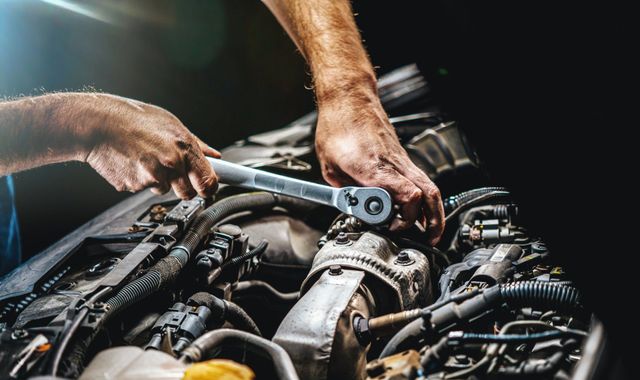All Categories
Featured
Your lorry's engine is just one of the most intricate systems in your vehicle, and every part plays a vital role in guaranteeing it runs smoothly. Amongst these, the timing belt is one of one of the most vital yet usually neglected parts of your engine. In charge of synchronizing the turning of the crankshaft and camshaft, the timing belt ensures the engine's shutoffs close and open at the correct times throughout the combustion procedure. If the timing belt stops working, it can cause extreme engine damage. Right here's why timing belt substitute is vital for your car's efficiency and durability.
What Is a Timing Belt? The timing belt is a long, toothed rubber or composite belt that links the crankshaft to the camshaft(s) in an inner combustion engine. Its job is to keep the engine's shutoffs and pistons in sync, guaranteeing the engine runs effectively. The timing belt additionally regulates various other essential engine functions like the water pump and the power guiding pump, depending upon the lorry.
![]()
Without the proper timing, the engine's valves and pistons can clash, resulting in expensive and substantial damage. Changing the timing belt on routine is one of the ideal ways to guarantee your engine operates at its best and protect against costly repairs.
Why Timing Belt Substitute Issues. Stopping Catastrophic Engine Damage: The most substantial risk of not changing a used timing belt is engine failure. Replacing the timing belt at the recommended periods is the ideal method to prevent such tragic damages, saving you from the stress and anxiety and high expense of engine repair services or replacement.
![]()
Preserving Engine Efficiency: A timing belt that remains in excellent problem makes sure that all engine parts operate in excellent consistency. If the timing belt is worn or extended, it can cause the engine to lose power, experience rough idling, or struggle to start. By replacing the timing belt frequently, you can keep your engine going for peak efficiency, which aids keep optimal fuel economy and efficiency.
Preventing Unforeseen Breakdowns: A busted timing belt can create your engine to stop suddenly, potentially leaving you stranded in the middle of a journey. By changing your timing belt on schedule, you reduce the danger of abrupt breakdowns that can leave you in a inconvenient or unsafe scenario. Routine maintenance minimizes the possibilities of experiencing these sort of interruptions, aiding you remain on the roadway much longer without stressing concerning your engine falling short.
Cost-Effective Upkeep: Timing belt replacement is much less costly than repairing or replacing an engine that's been harmed as a result of a timing belt failure. While the price of replacing the timing belt might differ depending upon your car and its location, it is much more affordable than the prices associated with significant engine repairs or substitutes. Changing your timing belt at the suggested intervals can conserve you a substantial quantity of cash over the future by preventing damage to your engine.
When Should You Replace Your Timing Belt? The timing belt does not last for life, and the majority of manufacturers recommend changing it between 60,000 and 100,000 miles. The exact timing depends on your automobile's make, model, and driving conditions, so it's essential to examine your proprietor's manual for particular assistance.
Indicators that your timing belt might require focus include unusual engine noises (such as a high-pitched whining or ticking audio), problem starting the engine, or a decrease in engine efficiency. If you see any of these indications, it's crucial to have the timing belt checked by an expert technician.
![]()
Verdict. The timing belt is a small however important part of your engine, and regular replacement is key to keeping your lorry's efficiency and stopping pricey damages. By remaining on top of timing belt maintenance, you'll ensure your engine runs effectively, prevent unexpected breakdowns, and shield your cars and truck from significant repair work. Watch on your car's advised timing belt substitute routine, and always speak with a trusted mechanic to keep your engine running efficiently for several years to find.
What Is a Timing Belt? The timing belt is a long, toothed rubber or composite belt that links the crankshaft to the camshaft(s) in an inner combustion engine. Its job is to keep the engine's shutoffs and pistons in sync, guaranteeing the engine runs effectively. The timing belt additionally regulates various other essential engine functions like the water pump and the power guiding pump, depending upon the lorry.

Without the proper timing, the engine's valves and pistons can clash, resulting in expensive and substantial damage. Changing the timing belt on routine is one of the ideal ways to guarantee your engine operates at its best and protect against costly repairs.
Why Timing Belt Substitute Issues. Stopping Catastrophic Engine Damage: The most substantial risk of not changing a used timing belt is engine failure. Replacing the timing belt at the recommended periods is the ideal method to prevent such tragic damages, saving you from the stress and anxiety and high expense of engine repair services or replacement.

Preserving Engine Efficiency: A timing belt that remains in excellent problem makes sure that all engine parts operate in excellent consistency. If the timing belt is worn or extended, it can cause the engine to lose power, experience rough idling, or struggle to start. By replacing the timing belt frequently, you can keep your engine going for peak efficiency, which aids keep optimal fuel economy and efficiency.
Preventing Unforeseen Breakdowns: A busted timing belt can create your engine to stop suddenly, potentially leaving you stranded in the middle of a journey. By changing your timing belt on schedule, you reduce the danger of abrupt breakdowns that can leave you in a inconvenient or unsafe scenario. Routine maintenance minimizes the possibilities of experiencing these sort of interruptions, aiding you remain on the roadway much longer without stressing concerning your engine falling short.
Cost-Effective Upkeep: Timing belt replacement is much less costly than repairing or replacing an engine that's been harmed as a result of a timing belt failure. While the price of replacing the timing belt might differ depending upon your car and its location, it is much more affordable than the prices associated with significant engine repairs or substitutes. Changing your timing belt at the suggested intervals can conserve you a substantial quantity of cash over the future by preventing damage to your engine.
When Should You Replace Your Timing Belt? The timing belt does not last for life, and the majority of manufacturers recommend changing it between 60,000 and 100,000 miles. The exact timing depends on your automobile's make, model, and driving conditions, so it's essential to examine your proprietor's manual for particular assistance.
Indicators that your timing belt might require focus include unusual engine noises (such as a high-pitched whining or ticking audio), problem starting the engine, or a decrease in engine efficiency. If you see any of these indications, it's crucial to have the timing belt checked by an expert technician.

Verdict. The timing belt is a small however important part of your engine, and regular replacement is key to keeping your lorry's efficiency and stopping pricey damages. By remaining on top of timing belt maintenance, you'll ensure your engine runs effectively, prevent unexpected breakdowns, and shield your cars and truck from significant repair work. Watch on your car's advised timing belt substitute routine, and always speak with a trusted mechanic to keep your engine running efficiently for several years to find.
Latest Posts
Untitled
Published Apr 16, 25
0 min read
Exploring the Perks of WyHy Share Interest-bearing Account
Published Apr 15, 25
1 min read
Selecting the Right Bank Account for Your Requirements
Published Apr 15, 25
1 min read